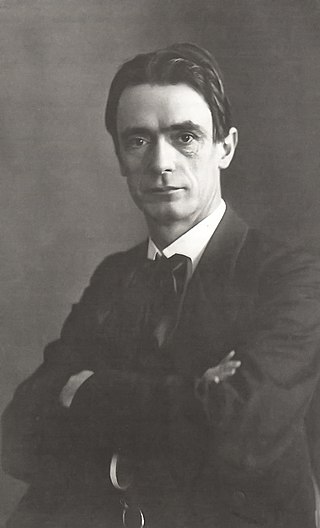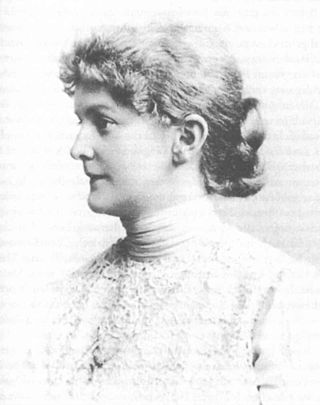Achievements
| Year | Competition | Venue | Position | Notes |
|---|---|---|---|---|
| Representing | ||||
| 1988 | Olympic Games | Seoul, South Korea | 24th | 76.02 m |
| 1990 | European Championships | Split, FR Yugoslavia | 26th | 73.12 m |
Rudolf Steiner (born January 16, 1951) is a retired track and field athlete from Switzerland, who competed in the men's javelin throw event during his career. [1] He represented his native country at the 1988 Summer Olympics in Seoul, South Korea, where he didn't reach the final after throwing 76.02 metres in the qualification round.
| Year | Competition | Venue | Position | Notes |
|---|---|---|---|---|
| Representing | ||||
| 1988 | Olympic Games | Seoul, South Korea | 24th | 76.02 m |
| 1990 | European Championships | Split, FR Yugoslavia | 26th | 73.12 m |
Anthroposophy is a spiritualist movement which was founded in the early 20th century by the esotericist Rudolf Steiner that postulates the existence of an objective, intellectually comprehensible spiritual world, accessible to human experience. Followers of anthroposophy aim to engage in spiritual discovery through a mode of thought independent of sensory experience. While much of anthroposophy is pseudoscientific, proponents claim to present their ideas in a manner that is verifiable by rational discourse and say that they seek precision and clarity comparable to that obtained by scientists investigating the physical world.

Rudolf Joseph Lorenz Steiner was an Austrian occultist, social reformer, architect, esotericist, and claimed clairvoyant. Steiner gained initial recognition at the end of the nineteenth century as a literary critic and published works including The Philosophy of Freedom. At the beginning of the twentieth century he founded an esoteric spiritual movement, anthroposophy, with roots in German idealist philosophy and theosophy. His teachings have been described as similar to Christian Gnosticism. Many of his ideas are pseudoscientific. He was also prone to pseudohistory.

In the religion of theosophy and the philosophical school called anthroposophy, the Akashic records are a compendium of all universal events, thoughts, words, emotions and intent ever to have occurred in the past, present, or future in terms of all entities and life forms, not just human. They are believed by theosophists to be encoded in a non-physical plane of existence known as the mental plane. There is no scientific evidence for the existence of the Akashic records.

The Slánský trial was a 1952 antisemitic show trial against fourteen members of the Communist Party of Czechoslovakia (KSČ), including many high-ranking officials. Several charges, including high treason, were announced against the group on the grounds of allegedly conspiring against the Czechoslovak Republic. General Secretary of the KSČ Rudolf Slánský was the alleged leader of the conspirators.
The General Anthroposophical Society is an "association of people whose will it is to nurture the life of the soul, both in the individual and in human society, on the basis of a true knowledge of the spiritual world." As an organization, it is dedicated to supporting the community of those interested in the inner path of schooling known as anthroposophy, developed by Rudolf Steiner.
Social threefolding is a social theory which originated in the early 20th century from the work of Rudolf Steiner. Of central importance is a distinction made between three spheres of society – the political, economic, and cultural. The conviction here is that when economy, culture, and polity are relatively independent of one another, they check, balance, and correct one another and thus lead to greater social health and progress. This should not be confused with laissez-faire economics, however. Steiner was concerned rather that businesses should not be able to buy favorable laws and regulations, and that governments should regulate the economy and protections for workers impartially and not be corrupted by participating in business. “A sphere of life calls forth interests arising only within that sphere. Out of the economic sphere one can develop only economic interests. If one is called out of this sphere to produce legal judgements as well, then these will merely be economic interests in disguise.”. Social threefolding aims to foster:

Marie Steiner-von Sivers was a Baltic German actress, the second wife of Rudolf Steiner and one of his closest colleagues. She made a great contribution to the development of anthroposophy, particularly in her work on the renewal of the performing arts, and the editing and publishing of Rudolf Steiner's literary estate.
Sergei Olegovich Prokofieff was a Russian anthroposophist. He was the grandson of the composer Sergei Prokofiev and his first wife Lina Prokofiev, and the son of Oleg Prokofiev and his first wife Sofia Korovina. Born in Moscow, he studied fine arts and painting at the Moscow School of Art. He encountered anthroposophy in his youth, and soon made the decision to devote his life to it.
Herbert Witzenmann was a German philosopher and anthroposophist.

Waldorf education, also known as Steiner education, is based on the educational philosophy of Rudolf Steiner, the founder of anthroposophy. Its educational style is holistic, intended to develop pupils' intellectual, artistic, and practical skills, with focus on imagination and creativity. Individual teachers have a great deal of autonomy in curriculum content, teaching methods, and governance. Qualitative assessments of student work are integrated into the daily life of the classroom, with standardized testing limited to what is required to enter post-secondary education.
Oskar Schmiedel was a pharmacist, anthroposophist, therapist, Goethean scientist and theosophist.
Arild Rosenkrantz was a Danish nobleman painter, sculptor, stained glass artist and illustrator.
Peter Selg is a German psychiatrist. He was born in Stuttgart and studied medicine in Witten-Herdecke, Zurich, and Berlin. Until 2000, he worked as the head physician of the juvenile psychiatry department of Herdecke hospital in Germany. Selg is director of the Ita Wegman Institute for Basic Research into Anthroposophy and professor of medicine at the Alanus University of Arts and Social Sciences (Germany). He lectures extensively and is the author of numerous books.
Wilhelm Rath was a German writer, translator, bio-dynamic farmer and anthroposophist. He is best known for his research and translations of certain medieval mystics, notably the Friend of God from the Oberland, Bernard Silvestris, Alanus ab Insulis and John of Hildesheim.
Francis Edmunds was an educator and Anthroposophist and the founder of Emerson College, Forest Row.
Alfred Cecil Harwood *05.01.1898 London (UK) †22.12.1975 Forest Row Sussex was a lecturer, Waldorf teacher, writer, editor and anthroposophist.
Arnold James Freeman was a British writer, philosopher, anthroposophist, adult educator, actor, director, Fabian Socialist, Labour Party candidate and co-founder of the anthroposophical magazine, The Golden Blade. He was the founder and first Warden of the Sheffield Educational Settlement.
Rudi Lissau, born 26 June 1911 in Vienna and died 30 January 2004 in Brookthorpe, United Kingdom, was a Steiner school teacher, author, lecturer and anthroposophist.
Johannes Tautz (30 September 1914 in Koblenz am Rhein to 13 March 2008 in Dortmund, was a historian, religious scholar, Anthroposophist, author and Waldorf teacher. He concerned himself with a better understanding of National Socialism and with questions of education in the twentieth century.
Frederik Willem Zeylmans van Emmichoven, was a Dutch psychiatrist and anthroposophist. From 1923 until his death in 1961 he was chairman of the Dutch Anthroposophical Society. He was a familiar figure in public life and had a considerable influence on the anthroposophic movement, particularly through his numerous lectures and his work as an author, which included the first biography of Rudolf Steiner.